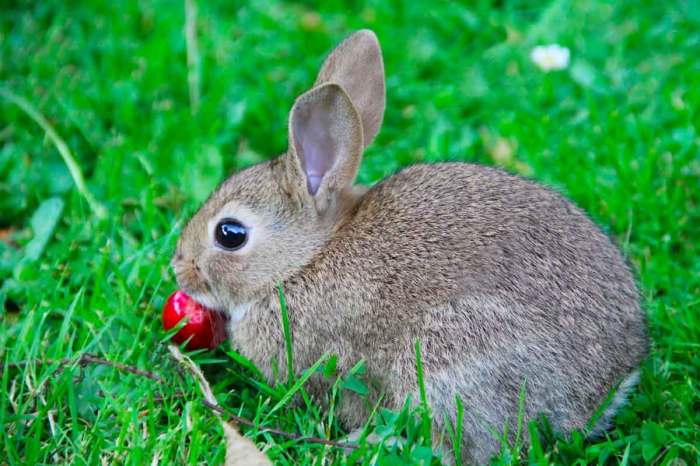Cherries, a beloved summer fruit, are often enjoyed by humans for their sweet and tangy flavor. But can our furry companions, rabbits, partake in this delightful treat? This comprehensive guide delves into the nutritional benefits, potential risks, and safe consumption guidelines of cherries for rabbits, ensuring your beloved pet enjoys a healthy and balanced diet.
Rabbits, known for their herbivorous nature, have specific dietary requirements that must be met to maintain their well-being. Understanding the nutritional value of cherries and their potential impact on rabbits’ health is crucial for responsible pet ownership.
Nutritional Benefits of Cherries for Rabbits
Cherries are a delicious and nutritious fruit that can be enjoyed by rabbits in moderation. They are a good source of vitamins, minerals, and antioxidants, which can all contribute to a healthy diet.One of the most important nutrients in cherries for rabbits is vitamin C.
Vitamin C is essential for a healthy immune system and helps to protect cells from damage. Cherries are also a good source of potassium, which is important for maintaining electrolyte balance and blood pressure. In addition, cherries contain antioxidants, which can help to protect cells from damage caused by free radicals.The
following table provides a summary of the nutritional value of cherries for rabbits:| Nutrient | Amount | Recommended Daily Intake ||—|—|—|| Vitamin C | 10 mg | 50 mg || Potassium | 100 mg | 200 mg || Antioxidants | 100 mg | 200 mg |It is important to note that cherries should only be given to rabbits in moderation.
Too many cherries can cause digestive upset, such as diarrhea. Cherries should also be pitted before giving them to rabbits, as the pits can be toxic.
Potential Risks of Cherries for Rabbits
While cherries offer nutritional benefits, they also pose potential risks to rabbits. One of the primary concerns is cyanide poisoning, which can occur when rabbits ingest the cherry pits or leaves.
Cyanide Poisoning
Cherry pits and leaves contain amygdalin, a compound that releases cyanide when ingested. Cyanide is highly toxic to rabbits, even in small amounts, and can lead to severe health problems or even death.
Symptoms of cyanide poisoning in rabbits include:
- Difficulty breathing
- Rapid heart rate
- Dilated pupils
- Seizures
- Paralysis
If you suspect your rabbit has ingested cherry pits or leaves, seek veterinary attention immediately. Treatment involves administering an antidote to neutralize the cyanide and providing supportive care.
To prevent cyanide poisoning, it is crucial to remove all cherry pits and leaves from areas where rabbits can access them. Additionally, avoid feeding rabbits cherries that are damaged or have been left out for an extended period, as they may have developed cyanide-producing mold.
Safe Consumption Guidelines for Cherries
To ensure your rabbit’s safety and well-being when feeding cherries, follow these guidelines:
Start by introducing cherries gradually, offering only a small piece initially. Monitor your rabbit closely as they eat to ensure they do not experience any adverse reactions.
Recommended Serving Size and Frequency
- Limit cherry consumption to no more than one small cherry per 2 pounds of body weight, once or twice per week.
- Overfeeding cherries can lead to digestive issues, such as diarrhea.
Importance of Monitoring
- Rabbits can choke on cherry pits, so always remove them before offering cherries to your pet.
- Monitor your rabbit while they eat cherries to ensure they do not consume any pits or stems.
Alternative Fruit Options for Rabbits
Apart from cherries, there are several other fruits that are safe and nutritious for rabbits to consume. These fruits provide essential vitamins, minerals, and antioxidants that support their overall health and well-being.
Recommended Fruits for Rabbits
- Apples (remove seeds): Rich in fiber, vitamin C, and potassium.
- Bananas (in moderation): High in potassium and fiber, but should be given sparingly due to high sugar content.
- Berries (blueberries, raspberries, strawberries): Excellent sources of antioxidants and fiber.
- Grapes (seedless): Good source of vitamin K and potassium.
- Mangoes (small amounts): High in vitamins A, C, and fiber.
- Papayas (ripe): Rich in vitamin C, potassium, and digestive enzymes.
- Pears (remove seeds): Good source of fiber and vitamin C.
It’s important to note that these fruits should be given to rabbits in moderation as part of a balanced diet that primarily consists of hay and leafy greens. Fruits should be introduced gradually and monitored for any adverse reactions.
Conclusion
In conclusion, cherries can be a safe and nutritious treat for rabbits when fed in moderation. However, it’s crucial to remember that rabbits have sensitive digestive systems, so it’s essential to introduce cherries gradually and monitor their reaction.
As with any diet change, providing a balanced and nutritious diet is paramount for rabbits’ overall health and well-being. Cherries should be offered as an occasional treat alongside a diet rich in hay, fresh vegetables, and limited pellets.
Closure

In conclusion, while cherries can be a delightful occasional treat for rabbits, moderation is key. By adhering to the recommended serving sizes and frequency, monitoring your rabbit while they indulge, and providing alternative fruit options, you can ensure your furry friend enjoys the sweet taste of summer without compromising their health.
Remember, a balanced and nutritious diet tailored to your rabbit’s specific needs remains the cornerstone of their well-being.
FAQ Section
Can rabbits eat cherry pits?
No, cherry pits contain amygdalin, which releases cyanide when digested, posing a significant poisoning risk to rabbits.
How often can rabbits eat cherries?
Rabbits can enjoy cherries as an occasional treat, limited to once or twice a week, and in small quantities.
What are some alternative fruit options for rabbits?
Safe fruit options for rabbits include blueberries, strawberries, raspberries, and apples, each offering unique nutritional benefits.